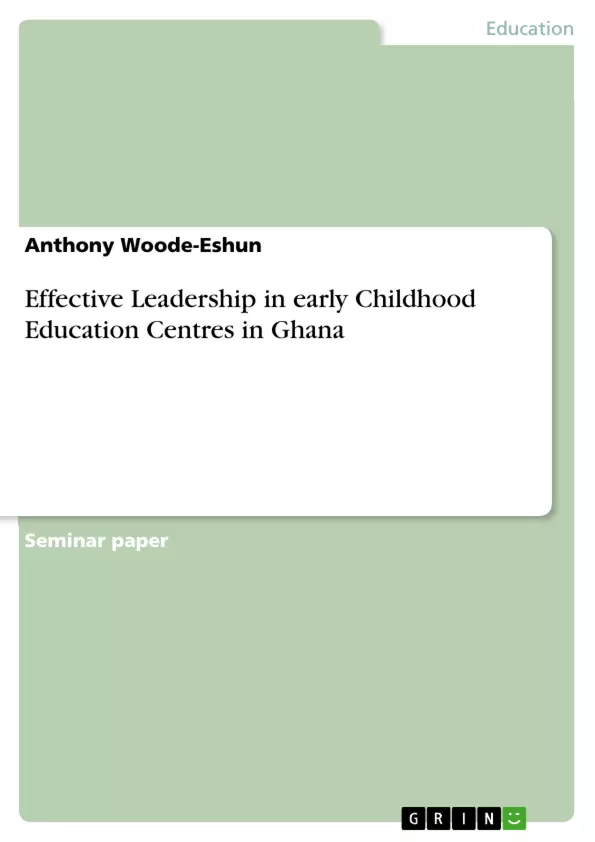In this paper, the concept of leadership and the characteristics of effective leaders of ECE centres in Ghana will be critically examined. Early childhood education settings are referred to by all sorts of names; kindergarten, preschools, early learning centres, or early childhood education centre. Irrespective of what label is used, it is known that apart from the home, the early childhood centre is where children spend most of their early years. Leadership in such places, therefore, has the potential to mould a child's approach and appreciation of humanity. It is important for leadership at this level to create a quality learning and living environment, in which children can be allowed to relate and interact with each other and with the caring staff, away from the hustle and hectic life of the fast-moving economy of the 21st century. After identifying some key individuals who contribute to the affairs of early childhood centres, then comes the question, who then is an effective leader?
Inhaltsverzeichnis (Table of Contents)
- Introduction
- Concept of Leadership
- Characteristics of Effective Leaders of Early Childhood Education Centres in Ghana
- Effective Leaders Uphold Values
- Being Visionary
- Dynamism
- Good Communicator
- Provides Encouragement
Zielsetzung und Themenschwerpunkte (Objectives and Key Themes)
This paper examines the concept of leadership and the characteristics of effective leaders in early childhood education centres (ECE) in Ghana. It aims to identify and analyze key traits that contribute to successful leadership within this context.
- Defining leadership and its role in ECE centres
- Exploring characteristics of effective leaders in ECE settings
- Analyzing the importance of upholding values, vision, dynamism, communication, and encouragement
- Examining the impact of effective leadership on the quality of early childhood education
- Providing insights into the challenges and opportunities faced by ECE leaders in Ghana
Zusammenfassung der Kapitel (Chapter Summaries)
- Introduction: This chapter introduces the context of early childhood education centres and highlights the importance of effective leadership in shaping children's early development. It poses the question of what constitutes effective leadership in this setting and sets the stage for the subsequent discussion.
- Concept of Leadership: This chapter explores various definitions of leadership and emphasizes the role of influence in achieving organizational goals. It highlights the importance of inspiring others to work towards a shared vision and success.
- Characteristics of Effective Leaders of Early Childhood Education Centres in Ghana: This chapter delves into the specific characteristics of effective leaders in ECE settings. It discusses the significance of upholding values, being visionary, possessing dynamism, being a good communicator, and providing encouragement. Each characteristic is elaborated upon with specific examples and insights into their relevance for successful leadership in ECE.
Schlüsselwörter (Keywords)
The primary focus of this paper lies in examining the characteristics of effective leadership in early childhood education centres in Ghana. Key terms and concepts include leadership, early childhood education, effective leadership, ECE centres, values, vision, dynamism, communication, encouragement, and organizational goals. This research explores the essential elements of leadership that contribute to the successful development and management of ECE institutions in Ghana.
Frequently Asked Questions
What defines effective leadership in Ghana's ECE centres?
Effective leadership in Early Childhood Education (ECE) involves creating a quality learning environment through vision, dynamism, and the ability to inspire staff and relate to children in a caring manner.
Why is a visionary leader important for preschools?
A visionary leader sets long-term goals and inspires the team to work towards a shared future. In the context of Ghana, this helps ECE centres navigate economic challenges and maintain high standards of education.
What are the key characteristics of a good ECE leader?
Key traits include upholding strong values, being an excellent communicator, providing constant encouragement to staff, and possessing the dynamism to adapt to the fast-moving 21st-century economy.
How does leadership impact a child's early development?
Leadership shapes the culture of the ECE centre. A positive and well-led environment moulds a child's approach to humanity and their appreciation of learning during their most formative years.
What is the role of communication in managing ECE centres?
Good communication ensures that staff, parents, and stakeholders are aligned with the centre's goals. It fosters transparency, resolves conflicts, and creates a supportive atmosphere for both educators and children.
- Citation du texte
- Anthony Woode-Eshun (Auteur), 2021, Effective Leadership in early Childhood Education Centres in Ghana, Munich, GRIN Verlag, https://www.grin.com/document/1153671



